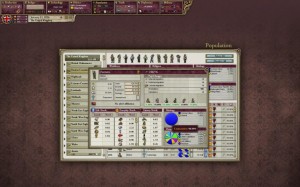I’ve been playing a bit of GalCiv 2 lately (mostly when I want a quick break from BGT) and in the process I’m messing around with some of the component stats and techs to make it more fun for me. I’m trying to maintain the balance of course, and I’m running test games to see how it plays out. But that’s just the preface to why I was playing GalCiv 2; the real point of this post is what happened when I played GC2.
See, Stardock, who make the GalCiv games, are kind of trolls. They’re on record as saying that the percentage bonuses you are shown on-screen aren’t necessarily accurate; they don’t think such perfect knowledge is something the players should have. I don’t know exactly how large the variables are but it means that if you see something that gives you +5% morale, you might only really be getting +3%, or you might get +7%, and so on.
The other, even bigger trolly thing that they do in GC2 is with random events. Like most Strategy games there are random events of various kinds that are intended to shake things up a bit. Unlike those in, say, Civ, where you get a free promotion or one building in one city becomes more useful, the GC2 “Mega Events” can change the face of the entire galaxy. And Stardock have set it up specifically so that events will fire that cause the galaxy to descend into batshit insane chaos. Two big alliances at peace? Random event causes war. Everyone’s peaceful and not paying much attention to military? Dread Lords show up. Huge, draining war breaks out? Income is doubled. Or halved. Either way it’s pretty huge. These aren’t your daddy’s random events. For instance, last night whilst I was trying desperately to catch up with the Altarians, this happened:

This is a Class 46 world. For those of you who don’t know what that means, let me crib from Tom Francis’ excellent AAR at PC Gamer, when he found a Class 28 World;
Let me put a Class 28 planet in context. Earth is a class 8. Risa, from the Star Trek series, the pleasure planet? That would be about a 15. The Fantasy Planet in Futurama, where everyone’s wildest dreams come true? Maybe 18. If you go to Church every Sunday and serve God’s will in all you do, you’ll go to a Class 23 when you die. I’d never seen a Class 28. Until now.
Class 46. How did this happen? And the astute may notice it’s surrounded by other, habitable worlds. It’s rare for so many to be so clustered. What happened? What happened was the same insane random event happened twice. This event improves the Class of every uninhabited world by 12 within a certain radius. It happened twice, in two adjacent sectors. The first time it happened I was agog and immediately switched to Full Colony Mode to grab the 20-odd worlds that just went from Class 0 (Uninhabitable) to Class 12/13-ish (I was running with some very strong Planet Quality bonuses as well, which compounded all this further). It also boosted already-habitable worlds, so a Class 9 that had been of moderate priority jumped up to Class 21. And because so many of the worlds remained unsettled between the two firings of the event, a lot of worlds went from Class 0 to Class 12, then to Class 23 or so.
But that world, the Class 46, Nesro III? Well you can see it’s “Uninhabitable” and has a little symbol beside it. You need a particular tech – in this case Barren World Colonization – to actually settle it. These techs are research intensive, but the worlds tend to be of particular quality. This here world, Nesro III, must have been about a Class 22 or so to begin with. Very much worth pursuing under most circumstances, and potentially worth teching towards all by itself. Nobody could claim it because the tech was still some time away. The event fired twice, and it got up to this.
And that, fillies and gentlecolts, is how you do random events. Take note other strategy game designers! And readers, tell us about your experiences where stuff like this resulted in, shall we say, extreme outcomes!






